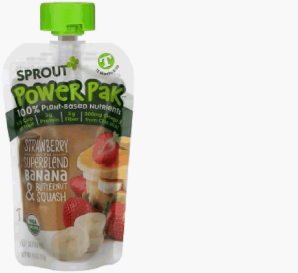Davidson v. Sprout Foods, Inc., --- F.4th ----, 2024 WL 3213277, No. 22-16656 (9th Cir. Jun. 28, 2024)
In a surprisingly-to-me divided opinion, the majority
rejects a theory that private claims
under the UCL using California’s Sherman Act as a predicate were impliedly
preempted by the FDCA, because the FDCA isn’t supposed to be enforced by
private parties. Although the existence of explicit preemption doesn’t always
mean that there’s no implied preemption as well, the FDCA’s preemption clause
is specific enough to the Sherman Act situation that I would have thought it
was obvious that there’s no implied preemption. At least the majority agrees
with me!
Anyway, the Sherman Law “incorporates by reference all
federal food labeling standards. These include a prohibition against labeling
the front of baby food containers with the product’s nutrient content.” That's because babies' nutrient needs aren't the same and the FDA was worried about, e.g., conspicuous low-fat claims. Defendant
“nevertheless produced pouches of baby food with labels on the front of the
package conspicuously stating the amount of nutrients the pouches contained.”
 |
| example pouch making protein, fiber and DHA claims |
The district court found preemption; as the majority reasoned, federal law “expressly permits states to enact standards identical to the federal standards and in this case, plaintiffs are attempting to enforce identical standards set forth in a state statute, the Sherman Law. The federal law does not limit the manner in which the state statute is enforced, and private enforcement of that statute does not conflict with federal enforcement of the FDCA.”
Although the Ninth Circuit has found implied preemption
where plaintiffs were trying to enforce duties allegedly created by the FDCA,
those were drug/device cases, not cases brought under the Sherman Law, a law
expressly permitted by the FDCA. “There is no reason we can perceive why
Congress would permit states to enact particular legislation and then deny
enforcement by their citizens.” Indeed, Medtronic, Inc. v. Lohr, 518 U.S. 470
(1996), interpreted a similar preemption provision and held that “[n]othing ...
denied [the state] the right to provide a traditional damages remedy for
violations of common-law duties when those duties parallel federal
requirements.”
The dissent would have found that the exclusion of private
suits from the FDCA meant that, at most, states could only create agencies to
enforce laws like the Sherman Law, but the majority correctly found that
atextual. One provision of the FDCA, § 310(b), allows states to enforce certain
provisions of federal law—but that deals only with enforcement of federal law,
not enforcement of state law. The dissent (a Trump appointee)
would instead have required the state law being enforced to come “independently”
from the common law, not from state adoption of federal standards. Conservatives
love the common law when it’s used to disable legal remedies, but the majority
noted that this jury-rigged standard didn’t make sense. (The dissent concludes
that state enforcement of “identical” rules interferes with the FDCA’s scheme
only when the common law isn’t involved—it is anti-legislative and allocates
all power to courts.)
The presumption against preemption was unnecessary here, but
also favored allowing the claim.
However, fraud-based claims were properly dismissed for
failure to plausibly allege misleadingness. (I note that, on remand, there
might be causation difficulties with the harm story for the pure Sherman Act
violation, but then again the plaintiffs can argue that, in a world complying
with the law, the products wouldn’t have been available for sale.)
As for those claims, plaintiffs alleged that Sprout’s labels
“misled consumers into believing the products provided health benefits to
children under two when the products were in fact nutritionally and
developmentally harmful.” But they failed to meet Rule 9(b)’s heightened
pleading requirement by failing to sufficiently allege why this implied message
was false. Plaintiffs alleged that Sprout’s products contain high amounts of
sugar and that sugars in pureed, pouch-based foods can lead to health issues
such as tooth decay and cited to several articles and reports suggesting that
pouch-based foods may lead to long-term health risks and hinder babies’
development. But these allegations were “largely unspecific to Sprout’s
products.” They didn’t explain “at what level sugars become harmful or why the
levels of sugar in these products, in particular, could cause harm.” Other harm
allegations were “largely speculative”: “consumption of pouches may lead to
long term health risks”; that if babies are “overly dependent on pouches,”
there are “noted delays in [their] motor development”; and that pouches “can be
a gateway to bad long-term snacking habits and routine overeating.” Plaintiffs
never actually alleged that Sprout’s products cause any of these harms.






No comments:
Post a Comment